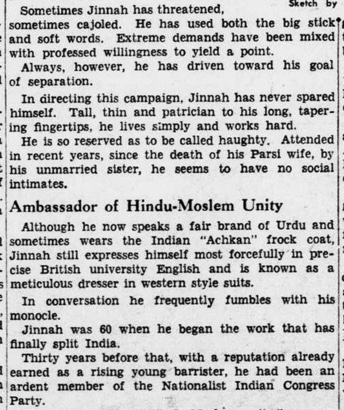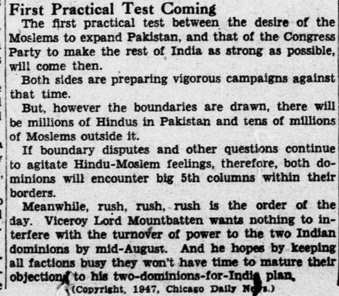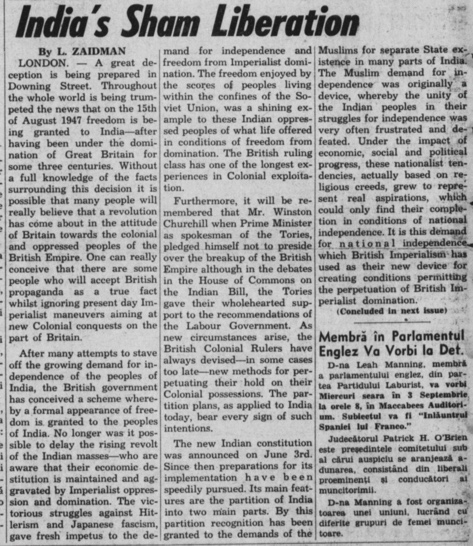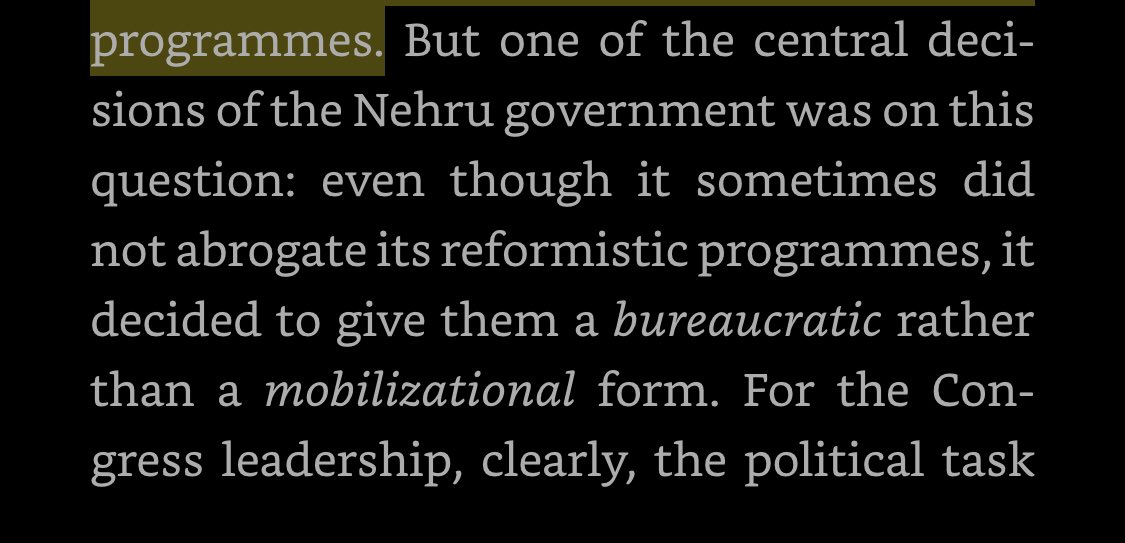
The Evening Star, June 15, 1947
A profile of Jinnah by Phillips Talbot, the erstwhile American ambassador to Greece turned journalist:
"One-Man Crusade Split India"
"Jinnah, Regarded by His Opponents as Unyielding Tyrant, Secured Separate Moslem State After 12-Year Fight"
A profile of Jinnah by Phillips Talbot, the erstwhile American ambassador to Greece turned journalist:
"One-Man Crusade Split India"
"Jinnah, Regarded by His Opponents as Unyielding Tyrant, Secured Separate Moslem State After 12-Year Fight"

"For Mohammed Ali Jinnah, the decision to carve a separate Moslem state out of India, approved here by the Moslem League Council, is a completely personal triumph" 

"If chaos and disruption should result, the Moslem League president may have won a pyrrhic victory. Yet it will be his and his alone, whatever comes of it"
"For a dozen years the Congress Party, large and powerful mouthpiece of most non-Moslem interests in India, fought Jinnah tooth and nail"
"The British government officially favored the unity of India, though many of its officials sympathized with Moslem League ambitions. Even his own community of Indian Moslems had rarely pulled together until he rallied it with the goal of a separate country"
"His biting invective and devastating logic, learned in early years at the bar and later in legislative chambers, have been tools in the battle for Pakistan, the independent Moslem state" 

"For a dozen years he has backed these up with cold fury of purpose and perhaps the shrewdest understanding in India of political strategy and tactics"
"Sometimes Jinnah has threatened, sometimes cajoled. He has used both the big stick and soft words. Extreme demands have been mixed with professed willingness to yield a point. Always, however, has ahas driven toward his goal of separation" 

"Although he now speaks a fair brand of Urdu and sometimes wears the Indian 'Achkan' frock coat, Jinnah still expresses himself more forcefully in precise British university English and is known as a meticulous dresser in western style suits"
"Jinnah was 60 when he began the work that has finally split India. Thirty years before that, with a reputation already earned as a rising young barrister, he had been an ardent member of the Nationalist Indian Congress Party"
"'The Ambassador of Hindu-Moslem amity,' was one description of him in those days... This seemed natural, as Jinnah came from a family converted from Hinduism only a few generations earlier, and he, and later his daughter, both married outside the Moslem community" 

"As he grew older, however, Jinnah turned to Moslem politics. The Congress Party, he said, had become spiritually Hinduized under Gandhi's leadership"
"The league in those days was a weak organization, largely controlled by large landowners and descendants of the old Mughal aristocracy. Jinnah determined to turn it into a formidable political machine" 

"The history of succeeding years is a nightmare for non-Moslem politicians. Raising the cry that 'Islam is in danger,' Jinnah and his lieutenants rapidly awakened the Moslem community to a new role"
"Nearly every student at the Aligarh Moslem University became a Moslem League worker. Examinations were postponed to permit students to make political tours before elections"
"Private armed bodies like the Kaksars, and later the Moslem National Guards, stimulated the growing movement, as did the support of religious Maulvis"
"Everywhere activity increased. In 1940 the league specifically declared for the partition of India. When the British Labor government took office after the war the cry was an article of faith among millions of Moslems"
"Jinnah, having whipped up the emotional storms, turned it into political capital. Let other parties deal with the league, he insisted, as the sole representative organization of Indian Moslems" 

"After the league had proved its popularity by nearly sweeping Moslem constituencies in general elections, Jinnah told the Congress Party and the British that he would gladly discuss terms with them if they would accept the principles of Pakistan first"
"Events here in New Delhi are working out a fantastic pace. Already a super-committee is starting work on ripping the government into two parts. Plans for the division of various departments may begin to ripen on a rough and ready basis next week" 

"But, however the boundaries are drawn, there will be millions of Hindus in Pakistan and tens of millions of Moslems outside it" 

"If boundary disputes and other questions continue to agitate Hindu-Moslem feelings, therefore, both dominions will encounter big 5th columns within their borders"
"Meanwhile, rush, rush, rush is the order of the day. Viceroy Lord Mountbatten wants nothing to interfere with the turnover of power to the two Indian dominions by mid-August."
"And he hopes by keeping all factions busy they won't have time to mature their objections to his two-dominions-for-India plan"
Oh wow, from wiki: "Talbot served as President of Asia Society from 1970-1982 and was awarded the Padma Shri in March 2002 for his efforts in fomenting peace between India and America during his tenure as President."
• • •
Missing some Tweet in this thread? You can try to
force a refresh











